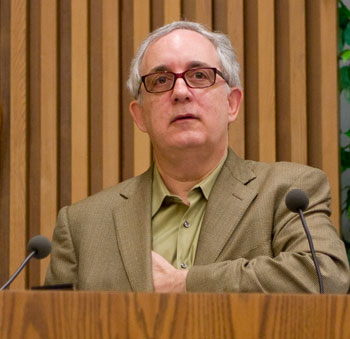Kapor seeks IDEAL of equal opportunity
 (Download Image)
Jacquelin Mcbride Mitchell Kapor
(Download Image)
Jacquelin Mcbride Mitchell Kapor
Everyone deserves the opportunity to make something of himself or herself, observed Mitchell Kapor, the founder of Lotus Development Corporation and the developer of Lotus 1-2-3.
Kapor spoke Wednesday afternoon in the Bldg. 123 auditorium as the opening speaker in the Laboratory’s "Science and Society" program series, sponsored by the Office of Strategic Diversity Programs.
"There are uncounted kids who have the talent and potential to make great contributions in science, math and engineering," Kapor said, adding that when they aren’t provided opportunities it is a "personal tragedy for them and a loss for society."
In the years since Lotus Development achieved financial success, Kapor and his wife, Freada, who joined him at the lecture, have founded a number of philanthropic ventures, one of which is the Level Playing Field Institute (LPFI).
Through its Initiative for Diversity in Education and Leadership, or IDEAL program, LPFI identifies underrepresented students who have been admitted to University of California, Berkeley on academic merit, but lack the financial means to attend.
In his presentation, Kapor told the story of one of the IDEAL students, Anthony Franco, who recently graduated from UC Berkeley with a degree in computer science.
Both of Franco’s parents never obtained more than an elementary school education, according to Kapor.
As Franco progressed in his education, he undertook an internship at a software company Kapor had started, bringing his own lunch to work every day to save money. In turn, the student helped his high school-age brother pay for a summer school course, so he also could attend UC Berkeley.
Eventually, Franco was offered a job at Microsoft in Silicon Valley, earning a greater salary than his parents’ combined income.
In the end, he declined the job and started working for an incubator company, following his dream of eventually founding his own business.
"Without programs like the one we have, he wouldn’t be where he is today," Kapor said. "We’re trying to help these students who have high potential compete with people from more privileged backgrounds."
Over the past eight years, the IDEAL program has assisted about 120 UC Berkeley students, providing renewable scholarships of about $8,500 per year, summer internship assistance, computer loans, tutors and other help.
Another LPFI program, called the Summer Math and Science Honors academy, or SMASH, is a three-year college preparatory course, where high school students spend five weeks each summer at UC Berkeley.
There, they attend class or study 10 hours per day for six days each week, focusing on math and science. About 150 students have or are participating in SMASH.
During his talk, Kapor also told the audience how a National Science Foundation summer program for top-notch math and science students held at Cal Tech had been a "life-changing experience" for him at the age of 15.
"It was my first hands-on experience with computers and I found that I was a computer guy. This summer science program helped me become who I became," Kapor said.
The "Science and Society" program was established as the follow-up component to the Museum of Tolerance leadership development program held in Los Angeles that many Lab managers have participated in since 2004.
Other planned speakers in the LLNL series will include Rep. Ellen Tauscher and J.D. Hokoyama, the president and CEO of Los Angeles-based Leadership Education for Asian Pacific organizations.




